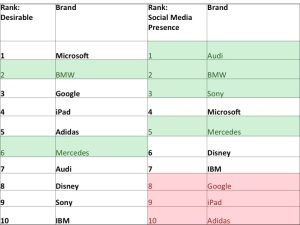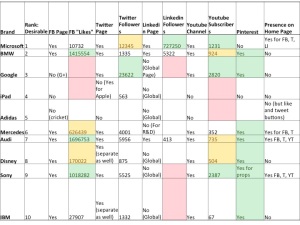
In the recently concluded, highly theatrical and much talked about Chintan Shivir – the strategy session for India’s ruling Congress Party, a big “action area” outlined was better use of Social Media. The party’s Young Turks said this was basically to reconnect with the currently alienated Urban Youth voters, acknowledging that Facebook and Twitter were now almost officially the “language of the urban youth” even in India.
I quickly checked accounts and found:
Congress:
Facebook Likes – 71,933
Twitter Followers – Could not find official page
BJP:
Facebook Likes – 811,063
Twitter Followers – 4,919
So, it was true – the congress party was woefully behind in adoption of Social Media.
Contrast with – yes ofcourse, Mr. Obama.

When he won his second year in office, he made history of sorts with Social Media – his tweet got retweeted & favorited the most times (RT – 7,03,650 times in 24 hrs and Favorites – 2,42,240), and the pic got 3.5 mil likes! His site my.barackobama.com was a key instrument in his campaign, as his Reddit Ask me Anything (AMA) site, and his youtube videos. Infact, as someone said, Social Media was to Obama what Radio was to Franklin D. Roosevelt and T.V. was to J.F.K!
Yes, I realise that the first (Congress) is a party while the second (Obama) is a politician, and many of our politicians in India have fairly active accounts even though the party doesn’t, (including Dr. Manmute Singh – how ironical is it – that he gets a voice on SM!). But the principles of usage are largely still the same for both. They do change when we look at another angle for usage of SoMe in politics – and that is when it is used as a megaphone for public opinion. Lets take a look at how SoMe is/ can be used:
By a Political Party:
a) Build awareness – Oh ofcourse – SoMe 101, isn’t it? This is one of the primary uses of SoMe (see the ABC of Social Media). But really, an easy way to spread the real message / releases / communication is open your facebook account and twitter handle. Closely linked with this, is:
b) Transparency – There is a lot of misinformation on the web, including many fake accounts. (The Indian Prime Minister was hit by one recently, causing the govt. to block a few accounts till verified for authenticity). Hence, an official Social Media presence allows you to be transparent, and released verified information
c) Increasing voter engagement – Apparently, the 2012 election night in the U.S. saw 300,000 tweets per minute. And election day/ the topic saw a total of 3.5 mil tweets! In our own India, organisations like Janagraha have been very active in voter enrollment.
d) Campaigning – These lessons we should learn from the U.S. – specially the 2012 election was the best case study in using SoMe to campaign – for BOTH parties!
The downside to this is that ruling parties can use SoMe for suppression – after all, SoMe makes the state far more porous – which can be seen as loss of control by authoritarian governments (more on this in a bit)
By Politicans:
a) The first is clearly to establish a connection/ empathy with the masses – Barack Obama did this so well. But, smaller countries have been doing this too – The Turkish President being a great example – not only does he use the channels well, he holds brainstorming meetings with Social Media experts!
b) Similar to parties, campaigning is the other use – depending on who is more powerful – the party or the politician, the relative weightages will get decided during campaigning.
c) An interesting use is because of its cost effectiveness. As this Kenyan Politician said – Social media campaigning allows them to reach out to the masses just as easily as parties/ people with richer coffers can – thus establishing equality in the hugely capital intensive political race!
By the People:
Social Media has proven to be the most effective way of bringing democracy to people’s homes.

After all, who can forget Arab Spring – its probably been the most powerful example of people’s activism dethroning governments, with a strong use of Social Media.
The earliest examples of digital media usage in transferring information quickly, virally to assemble people against a cause was probably Philipines in 2001 for Joseph Estrada’s impeachment – 7 mil text messages mobilised 1 mil people. Moldova in 2009 – 30,000 protestors assembled using Facebook, Livejournal, Twitter; Iran when Agha Soltan dies in 2009, The Jasmine revolution in Tunisia, and Tahrir in Egypt in 2011 – when Google executive Wael Ghonim put up a video of Khaled Said dying on youtube and sparked off the revolution that led to Hosni Mubarak’s downfall. The rate of tweets in Egypt, thanks to this subject went from 2300/day to 2,30,000/day! And then in true dominoes effect Lebanon/ Syria/ Libya started seeing signs of collapse of governments.
It’s interesting – as a Media Monitoring/ Listening company, we actually benefitted from Arab Spring – we got new business from Governments in countries like Senegal and Morocco since they decided to be more pro-active in “listening” to their people!
Ofcourse, there is a downside to this – it doesn’t always go well – the use of Social Media for activism. Specially when governments are able to apply censors – infact, in Iran, during the Agha Soltan movement, the government actually used Social Media to spread wrong information for protest gatherings, and many people died as a result! Other failures were – Belarus in Mar 2006, where post the revolution dying down, the govt. cracked down ever more on censorship; the Green movement in 2009 and the Red Shirt Movement in Thailand in 2010.
But activism is not the only benefit to people that Social Media gives – a Pew Study shows fairly high usage of Social Media, specially amongst the youth, to share political content/ views with their peers.
And finally ofcourse, people should use it for feedback to their political parties and governments – a bit like the use of twitter in business as the “modern help desk/ customer service center”. Thats why our friends in the African governments commissioned us for listening – and thats a really good use of Social Media – to be the instrument that carries people’s voices to their elected (or otherwise) representatives!
The final really interesting/ innovative use of Social Media, more in governance than in politics, seems to be in “crowd sourcing”. The 2 colest case studies for this were:
a) Iceland: In 2011, Iceland allowed its people to “create”/ “vote for” its own constitution via a Social Media referendum! This came in the wake of the “Pots and Pans” revolution, where the people of Iceland refused to pay back to Britain a debt of 2.3 billion that their erstwhile private banks borrowed; and then brought down their government! Impressive, huh? (even though they only have a population of some 800 odd thousand)
b) Sweden: Again late in 2011, the Swedish government, in a bid to promote tourism, gave over its @Sweden twitter account to its citizen journalists. Via a campaign called Curators of Sweden, it allowed different people to tweet about Sweden every week – for almost 7 months – till it all blew up in their faces when their tweeter started posting arguably offensive/ controversial content.
But think about the power of this idea – almost a wiki – constitution, or a wiki – law journal can be created – true democracy, huh?
OK, this is going on and on, but I do want to wind up by saying that ofcourse all Social Media is NOT always good for all politics – even Malcolm Gladwell contends that Social Platforms use very weak ties to form movements, and hence the motivation to keep on at any movement in a sustained fashion is lacking. If you look at how older/ longer lasting movements have formed and then taken place – they took years of fairly deep structural changes in social/ civil religious or moral fibres – and then erupted in the form of sustained movements.
Also, use of Social Media by governments has had its own gaffes – the EU’s commercial “Growing Together” drew a lot of flak as it was called racist. Our own politicians have seen downfall as a result of bad tweets.
But, net net, what one hopes that Social Media does, is initiate the people of any country atleast into “slacktivism” as a first step – and hope they climb the ladder of engagement with politics to ultimately really participate in making their own governments work better!
This is true of me, as it is I think of many of my friends – evidenced in a recent upsurge of mass/ public opinion against the government in a barbaric case of Sexual harassment leading to death of a young girl in Delhi.
Come on, all, lets raise our voices – Social media as a starter, and more active ways of change later…..what say you?
Tags: arabspring, chintan shivir, Facebook, politics, Social Media, twitter










